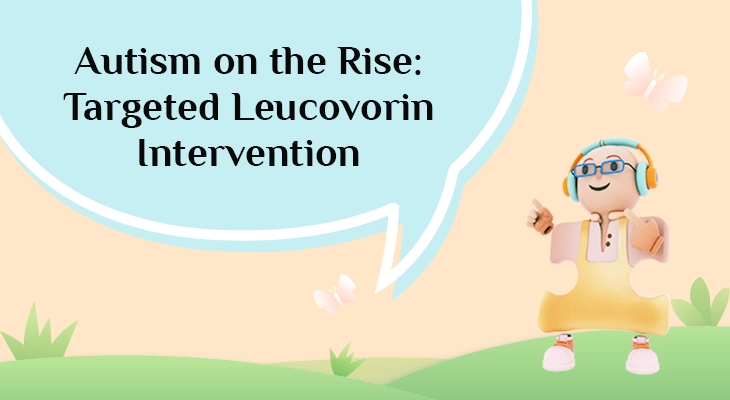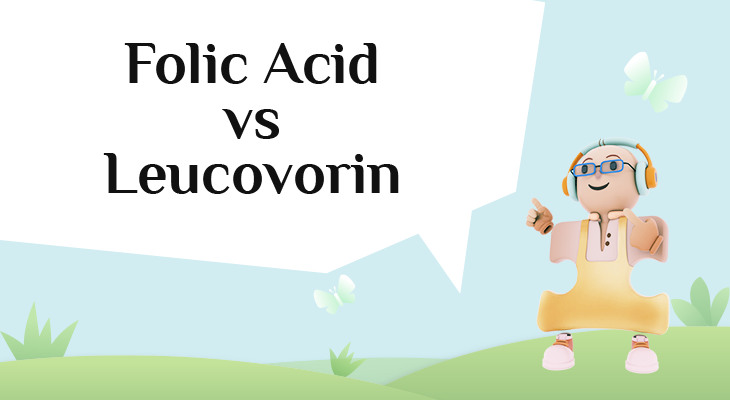
Introduction
There is growing evidence that folinic acid supplementation can benefit children with autism spectrum disorder (ASD) who test positive for folate receptor alpha autoantibodies (FRAAs), which are associated with cerebral folate deficiency. Research has shown that folinic acid (a form of a reduced folate) may help improve communication and reduce ASD symptoms, especially in those with FRAAs.
Most recently, a 2024 study from India discusses the utility of folinic acid in this context. It supports previous findings where folinic acid, also known as leucovorin, has shown promise in improving verbal communication and reducing autism severity in children with FRAAs.
https://link.springer.com/article/10.1007/s00431-024-05762-6
The study suggests that folinic acid could be a therapeutic option for children with ASD, particularly those with elevated FRAAs, which disrupt folate metabolism. The current trial showed that oral folinic acid has a role in improving the core features of ASD, with more pronounced improvement in the subset with high titers of FRAAs. This suggests that pediatricians may consider testing for these autoantibodies and administer oral folinic acid to children who test positive. As this trial did not show any adverse effects causally related to folinic acid in any participants, it appears that oral folinic acid can be safely administered universally to all children with ASD.
Further research is recommended to confirm the long-term efficacy and safety of this treatment, but this adds to the building evidence of the efficacy of folinic acid in this particular patient population.
Several key publications have previously highlighted the utility of folinic acid (leucovorin) in children with autism spectrum disorder (ASD) who have folate receptor alpha autoantibodies (FRAAs). These studies suggest that folinic acid supplementation can improve core symptoms of autism, particularly in those with elevated FRAAs, a condition associated with cerebral folate deficiency. Here are some significant studies:
- Frye et al. (2018): This randomized, double-blind, placebo-controlled trial demonstrated that folinic acid significantly improved verbal communication in children with ASD who had language impairments. Children with higher FRAA levels were particularly responsive to the treatment. The study published in Molecular Psychiatry is one of the most cited works. It was a randomized, double-blind, placebo-controlled trial that found folinic acid significantly improved verbal communication in children with ASD and language impairment, especially in those with high levels of FRAAs.
- Frye et al. (2022): This study further explored the role of folate receptor alpha in autism, showing that folinic acid supplementation reduced autism severity in children with ASD, particularly those with detectable FRAAs.
- Frye et al. (2014): Another study by Frye and colleagues highlighted the link between FRAAs and thyroid dysfunction in children with ASD, suggesting that folinic acid could modulate this dysfunction and contribute to improved adaptive behaviors.
- Renard et al. (2020): In this randomized trial, folinic acid improved autism scores, particularly in children with FRAAs, indicating its potential as a targeted intervention for cerebral folate deficiency.
These studies provide strong evidence supporting the use of folinic acid in children with FRAAs, demonstrating its potential to alleviate both communication challenges and other core symptoms of ASD.
Clearly, the evidence is continuously building in supporting the use of folinic acid in those that have folate receptor autoantibodies. And this seems to be a logical conclusion based on what we know about the mechanism of folate receptor autoantibodies.
Folate receptor alpha autoantibodies (FRAAs) interfere with the body’s ability to transport folate into cells, particularly the brain, which can lead to a condition known as cerebral folate deficiency (CFD). Folate is crucial for brain development, function, and repair. FRAAs are antibodies that target the folate receptor alpha (FRα), a protein located on the surface of cells, which normally binds folate and facilitates its transport across cell membranes, especially in the brain. There are two distinct autoantibodies:
Blocking FRAAs; These antibodies bind to the folate receptor in such a way that they block folate from attaching to the receptor. This inhibits the normal uptake of folate into the brain, leading to deficiencies despite normal dietary intake or blood folate levels.
Binding FRAAs; These antibodies bind to the folate receptor but do not prevent folate from attaching. However, their presence alters the receptor’s structure or function, which can affect the folate transport process.
When these autoantibodies are present, they reduce the brain’s access to folate, which can lead to a variety of neurological and developmental issues. This has been linked to autism spectrum disorder (ASD) and other neurodevelopmental disorders. In conditions like cerebral folate deficiency, these autoantibodies can impair brain function due to insufficient folate, which is essential for DNA synthesis, repair, and methylation processes critical to brain development and neuroplasticity.
Studies have shown that children with ASD who test positive for FRAAs often exhibit improvements in symptoms, such as language and behavior, when treated with folinic acid (a form of reduced folate), bypassing the need for the receptor-mediated transport process.
Folinic acid is able to circumvent the blocked folate receptor alpha and enter the cell through another receptor known as the reduced folate carrier. In these instances, folate is able to enter the brain and cerebral spinal fluid. It is thought that it is through this type of mechanism that improvements are seen in children with autism. This is all very exciting science and we are grateful that studies continue to elucidate this further!



